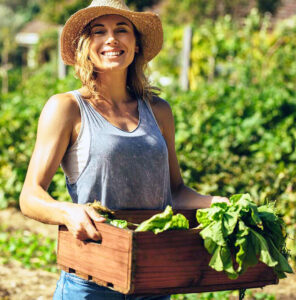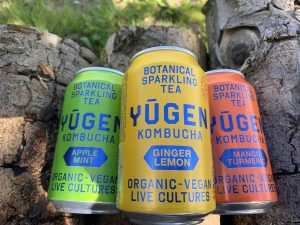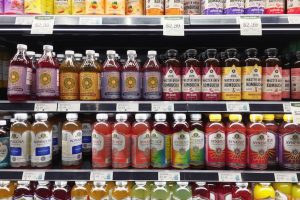
There is a lot to say about juices.
Whether they are raw, pasteurized, slow juiced, cold-pressed, from concentrate or not from concentrate…
The list goes on and on and yet, they are all called juices.

Needless to say, there are actually big differences between each type of juice. When it comes to juices and their health benefits, the scientific world is not unanimous. More specifically, there is no consensus about which specific processing method has the best result in preserving the vitamins and nutrients from fruit and vegetables and how this results in extra health benefits.
What there is a major scientific consensus about however, is that less processed food is a lot healthier than processed food. That’s why Yugen only works with the highest quality, pure organic juices and not from concentrate.
We never settle for lesser alternatives and source on an almost daily basis for the best quality on the market. Unfortunately not all fruit is produced locally so we have to source globally. In this process we pay attention to local production conditions and practices.
Because we believe in transparency, we’d like to share the origins of our fruit juices and as a bonus, we've added some fun facts about each fruit or spice!
Ginger
Ginger originated in the tropical rainforests from the Indian subcontinent to Southern Asia. The underground stem, also known as the rhizome, of the ginger plant is what is used as spice, so not actually the root.
Ginger produces clusters of white and pink flower buds that bloom into yellow flowers, and the perennial reed-like plants are about a meter (3 to 4 feet) tall. Because of its aesthetic appeal and the adaptation of the plant to warm climates, it is often used as landscaping around subtropical homes. As if ginger wasn't beautiful enough!

Ginger also contans a diverse array of many important vitamins and minerals. One of them is gingerol, a compound with potent antioxidant and anti-inflammatory properties that has been linked to many unique health benefits.
Our ginger comes from Peru. Most ginger is produced in India and China but we prefer the extra spiciness of the Peruvian kind.

Blood orange
"Nature's Candy"
The blood orange is a deliciously juicy fruit with a reddish flesh. Originally from China and Malaysia, this citrus fruit was brought to Europe by Arab traders in the 10th century. Blood oranges usually bloom in winter and produce their sweet and sour fruit only once a year, contributing to their unique and sought-after flavour.
Blood oranges, like other citrus fruits, are high in vitamin C and can contribute to a healthy immune system. In addition, they are rich in antioxidants and have anti-inflammatory properties. Although our blood orange juice comes from Sicily, the largest producers of blood oranges are Spain, Italy and the United States; together they account for more than 80% of world production.
Because of their beautiful, deep color and rich flavor, blood oranges are loved by chefs and foodies around the world. Thus, they are used in salads, juices, desserts or as a refreshing snack.
Lemon
When life gives you lemons, make ginger lemon kombucha!

The lemon is native to South Asia, primarily North eastern India. The average lifespan of lemon trees is over 50 years. Lemon trees usually bloom throughout the year, and the fruit is picked 6 to 10 times a year. One tree can produce between 225 and 270 kilograms of lemons in a year. More than enough to provide us for our zesty ginger lemon kombucha!
Did you know that lemons can save lives? Because lemons are high in vitamin C they can prevent the disease scurvy which was common among sailors stuck on ships for months.
Our lemon juice comes from Spain. The top producers, however, are India, Mexico, China, Argentina, Brazil, and Turkey who collectively account for 65% of the global production.
Lime
A squeeze of lime brightens any time!

Limes are small but mighty! Native to Southeast Asia, limes have travelled far and wide, becoming a staple in cuisines around the globe. Did you know that limes were once a sailor's best friend? Just like lemons, they were used to prevent scurvy during long sea voyages, earning British sailors the nickname "Limeys."
Lime trees can produce fruit year-round in tropical climates, and a single tree can yield over 100 kilograms of limes annually. These little green powerhouses are packed with vitamin C, antioxidants, and a refreshing zing that can elevate any dish or drink.
Our lime juice comes from Brazil, one of the world’s top lime producers, known for its high-quality, aromatic limes. Whether it’s adding a zesty kick to our kombucha or brightening up a dish, limes bring a burst of natural flavour that’s simply unbeatable.
Peach
Life is just peachy when you add a bit of sweetness to your day!

Peaches are a symbol of summer, with their juicy sweetness and vibrant colour. Native to Northwest China, peaches have been cherished for thousands of years and are often associated with longevity and vitality. The peach tree is a member of the rose family, and it can produce fruit for up to 20 years, offering a bounty of these delicious treats each season.
Did you know that in ancient China, peaches were believed to ward off evil spirits? They were even used as symbols of immortality! Today, peaches continue to bring joy and health benefits, being rich in vitamins A and C, and full of antioxidants that support a glowing complexion.
Our peaches come from sunny Spain, where the warm climate and fertile soil produce some of the most flavourful peaches in the world. Whether enjoyed fresh, in desserts, or in our refreshing peach kombucha, these fruits are a perfect reminder that life is truly peachy!
Apple
An apple a day keeps the doctor away, so they say...

Did you know there are more than 8,000 varieties of apples? This is the largest variety of fruit to exist. How many varieties can you name?
Apples contain high levels of boron, which stimulates electrical activity of the brain and increases mental alertness. Interesting fact is that apple seeds also contain cyanide, a potentially deadly chemical. Don't worry about it though, apples contain such a small dose of cyanide that it won't be harmful.
New York city is known as “The Big Apple”, but the biggest apple producing country is actually China. The biggest apple however was a Hokuto apple grown in Japan. It measured a whopping 1.8kg. Crazy, right?
Our apple juice comes from Poland, which is the world's fourth largest apple producer.
Pear
A pear-fect balance of sweetness and crunch!

Pears have been adored for centuries, with their origins tracing back to the foothills of Central Asia and Europe. These elegant fruits were celebrated in ancient Greece and Rome, not just as a delicious snack but also as a natural remedy for various ailments. Fun fact: the pear tree is a symbol of immortality in Chinese culture, and its fruit represents grace and longevity.
Pears are as versatile as they are nutritious. Packed with dietary fiber, vitamin C, and potassium, they support digestion and boost immunity while offering a subtly sweet flavor that complements both savory and sweet dishes. And did you know? Pears are one of the few fruits that improve in texture and taste after being harvested, ripening to juicy perfection off the tree.

Our pears come from Belgium, where the cool climate and fertile soils produce some of the finest, juiciest varieties in Europe. Whether in salads, desserts, or sipped in a refreshing pear kombucha, they’re the perfect reminder that nature’s sweetness is always in season.
Raspberry
The Hidden Gems of the Vine

Raspberries are nature's intricate marvels�”each one a cluster of tiny, individual fruits, each cradling a single seed. But don't let their delicate structure fool you; these berries pack a punch when it comes to flavor and health benefits. High in fiber and rich in vitamins, raspberries offer a burst of sweetness and nutrition in every bite.
Our raspberries are carefully selected to ensure the best quality. Grown on sun-kissed vines, they are harvested at the peak of ripeness to capture the essence of their natural taste. Just a handful of these berries can enrich your diet with antioxidants and essential nutrients, making our Raspberry Kombucha a smart, scrumptious choice for health-conscious indulgence.
Savor the sweet complexity of raspberries in our kombucha and let every sip remind you of the bountiful goodness that comes from a tiny, yet mighty, fruit of the vine.

Mango
You could say that mango is the most popular fruit because more fresh mangoes are eaten around the world every day than any other fruit. We certainly understand why, it's just so freakin' delicious!

Mango is often called the king of fruits not just for its taste and super flashy yellow color, but also for the array of health benefits it offers. Did you know that mango contains over 20 different vitamins and minerals? Most notably vitamin C, vitamin A, folate, fiber, vitamin B6, and copper.
The mango is even the national fruit of India, Pakistan, and the Philippines. The tree itself can grow to 30 meters tall. No wonder it’s also the national tree of Bangladesh.
Our mango comes from India. There are over 400 mango varieties in the world but we chose the Alphonso Mango. It’s the Rolls Royce of Mangos because of its rich, sweet flavour.

Turmeric
Turmeric has a very similar appearance to that of ginger and both are considered miracle spices. However, turmeric is orange and ginger is yellow. People who have used fresh turmeric know its dyeing power is no joke. It’s very orange and very hard to clean (we speak from experience). That’s why it’s also used a natural dye.

The medicinal use of turmeric dates back to prehistoric times. It’s a staple amongst ayurvedic doctors because it contains more than 300 naturally occurring components including beta-carotene, ascorbic acid (vitamin C), calcium, flavonoids, fiber, iron, niacin, potassium, zinc and other nutrients.
Our turmeric comes from India. Not a surprise when you know that India produces nearly all of the world’s turmeric crop and consumes 80% of it as well.
Cherry
There are more than 1,000 varieties of cherries in the world, but only a small percentage of that number is used commercially. Did you know cherries actually belong to the rose family?

Not every cherry tree produces cherry fruit. Some varieties have been bred to produce beautiful flowers. In Japan, the cherry blossom symbolizes the transience of life, which is a major theme in Buddhism. The cherry blossom tree is known for its short but brilliant blooming season, a natural process that metaphorically describes human life.
Cherries are a rich source of antioxidants and are packed with potassium, vitamin C and B complex, and melatonin. That’s the sleepy hormone so cherries can actually improve your night’s sleep! Cherries also contain few calories. The perfect evening treat if you ask us.
And last but not least, cherries are the luckiest fruit of all since they are never far from the one they love. Get it?
Our cherries come from Germany and Serbia, two major producers of cherries in the EU.
Grapefruit
Grapefruit was created in Barbados when the sweet orange and pomelo were accidentally bred together. Both ancestors of the grapefruit were introduced from Asia in the seventeenth century.

The name grapefruit comes from the fact that the fruit grows in grape-like clusters, and can imaginatively be looked at as grapes when small and green.
Grapefruit has many nutritious elements. It is an excellent source of vitamin A (in the form of carotenoids) and vitamin C. Grapefruit is also a good source of pantothenic acid, copper, dietary fiber, potassium, biotin and vitamin B1. It’s so potent that it can actually increase the effectiveness of medicinal compounds.
Our grapefruit comes from Israel but the top producer is China, followed by the United States and Mexico.
Pineapple
The plant is indigenous to South America and is said to originate from the area between southern Brazil and Paraguay. The plant takes almost three years to reach maturation and it can fruit a total of three times during its lifetime. Have you seen a pineapple grow? It’s so weird and funny looking!
Anyway, pineapple plants have beautiful flowers which can vary from lavender through light purple all the way to red. When creating its fruit, it usually produces up to 200 flowers. Once it flowers, the individual fruits of the flowers join together to create what is commonly referred to as a pineapple. So the pineapple fruit itself is actually a bunch of “fruitlets” fused together.

Pineapple contains lots of nutrients, vitamins, and minerals, including copper, potassium, calcium, magnesium, manganese, vitamin C, thiamin, B6, beta-carotene, and folate as well as soluble and insoluble fiber and bromelain. Bromelain gives that prickly sensation when eating fresh pineapple and boosts your digestion.
We source our pineapples from Costa Rica, the number one producer in the world.
Strawberry
Who doesn't like strawberries? Their unique delicious sweet taste, beautiful color and perfect bitesize shape makes this a favourite amongst kids. But not just amongst kids, adults also love the sweet berry.
In France, strawberries are believed to be an aphrodisiac. They are served to newlyweds at traditional wedding breakfasts in the form of a creamy sweet soup. Besides their enticing flavour, strawberries also seduce us with their delicious scent. Makes sense, since the fruit is actually a member of the rose family.

Weirdly enough, the strawberry is the only fruit that grows its seeds on the outside instead of in the core. Since the seeds are on the outside, strawberries aren't true berries, like blueberries or grapes. You can actually use the seeds to start your own plants, but most strawberries will reproduce with the help of runners, not seeds.
They are the first fruit to ripen in the spring, providing us with lots of nitrate and vitamin C. This can increase the flow of blood & oxygen to the muscles, which is perfect for those sore legs in the wintertime.
Did you know there is actually a museum in Belgium (in Namur) just for strawberries? Yup, we really are crazy about this cute little berry…
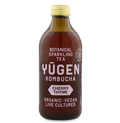 I like Yugen Kombucha
I like Yugen Kombucha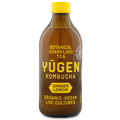
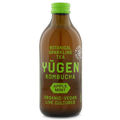 J'adore Yugen Kombucha
J'adore Yugen Kombucha

